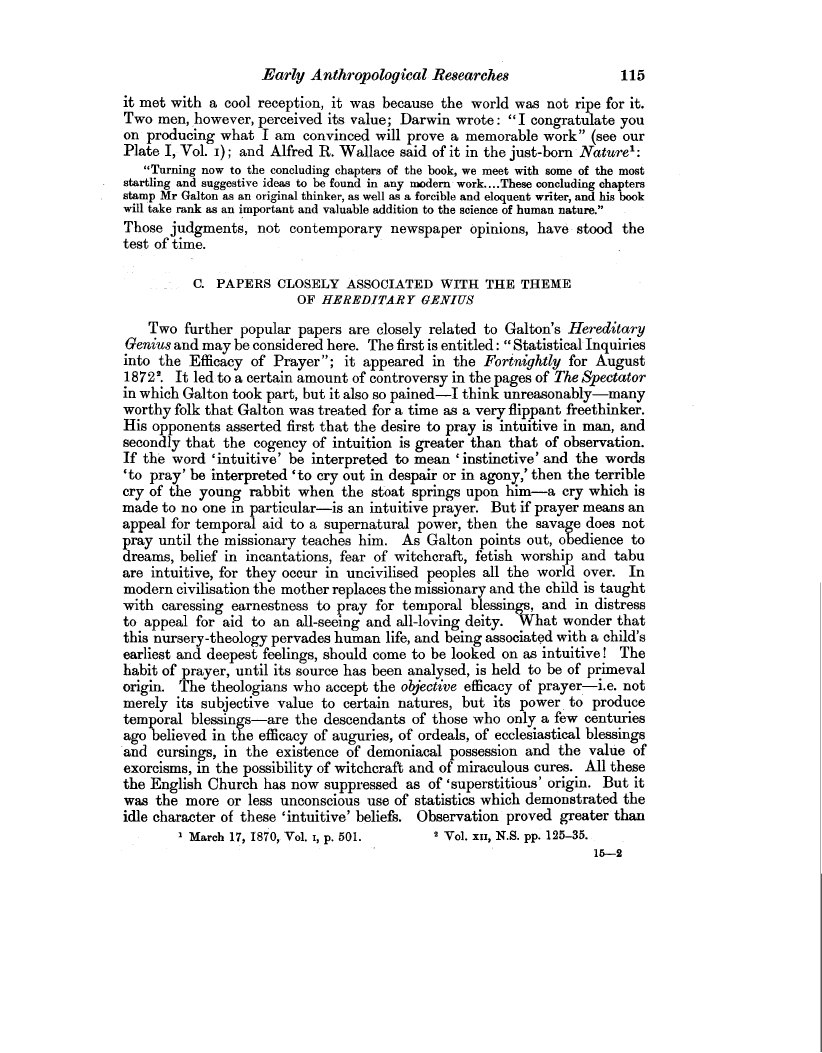Early Anthropological Researches 115
it met with a cool reception, it was because the world was not ripe for it. Two men, .however, perceived its value; Darwin wrote : " I congratulate you on producing what I am convinced will prove a memorable work" (see our Plate I,-Vol. i) ; and Alfred R. Wallace said of it in the just-born Nature':
"Turning now to the concluding chapters of the book, we meet with some of the most startling and suggestive ideas to be found in any modern work... .These concluding chapters stamp Mr Galton as an original thinker, as well as a forcible and eloquent writer, and his book
will take rank as an important and valuable addition to the science of human nature."
Those judgments, not contemporary newspaper opinions, have stood the test of time.
C. PAPERS CLOSELY ASSOCIATED WITH THE THEME OF HEREDITARY GENIUS
Two further popular papers are closely related to Galton's Hereditary Genius and may be considered here. The first is entitled : " Statistical Inquiries into the Efficacy of Prayer it appeared in the Fortnightly for August 1872$. It led to a certain amount of controversy in the pages of The Spectator in which Galton took part, but it also so pained-I think unreasonably-many worthy folk that Galton was treated for a time as a very flippant freethinker. His opponents asserted first that the desire to pray is intuitive in man, and secondly that the cogency of intuition is greater than that of observation. If the word `intuitive' be interpreted to mean `instinctive' and the words `to pray' be interpreted 'to cry out in despair or in agony,' then the terrible cry of the young rabbit when the stoat springs upon him-a cry which is made to no one in particular-is an intuitive prayer. But if prayer means an appeal for temporal aid to a supernatural power, then the savage does not pray until the missionary teaches him. As Galton points out, obedience to dreams, belief in incantations, fear of witchcraft, fetish worship and tabu are intuitive, for they occur in uncivilised peoples all the world over. In modern civilisation the mother replaces the missionary and the child is taught with caressing earnestness to pray for temporal blessings, and in distress to appeal for aid to an all-seeing and all-loving deity. What wonder that this nursery-theology pervades human life, and being associated with a child's earliest and deepest feelings, should come to be looked on as intuitive ! The habit of prayer, until its source has been analysed, is held to be of primeval origin. The theologians who accept the objective efficacy of prayer-i.e. not merely its subjective value to certain natures, but its power, to produce temporal blessings-are the descendants of those who only a few centuries ago believed in the efficacy of auguries, of ordeals, of ecclesiastical blessings and cursings, in the existence of demoniacal possession and the value of exorcisms, in the possibility of witchcraft and of miraculous cures. All these the English Church has now suppressed as of `superstitious' origin. But it was the more or less unconscious use of statistics which demonstrated the idle character of these `intuitive' beliefs. Observation proved greater than
' March 17, 1870, Vol. i, p. 501. a Vol. xii, N.S. pp. 125-35.
15-2

